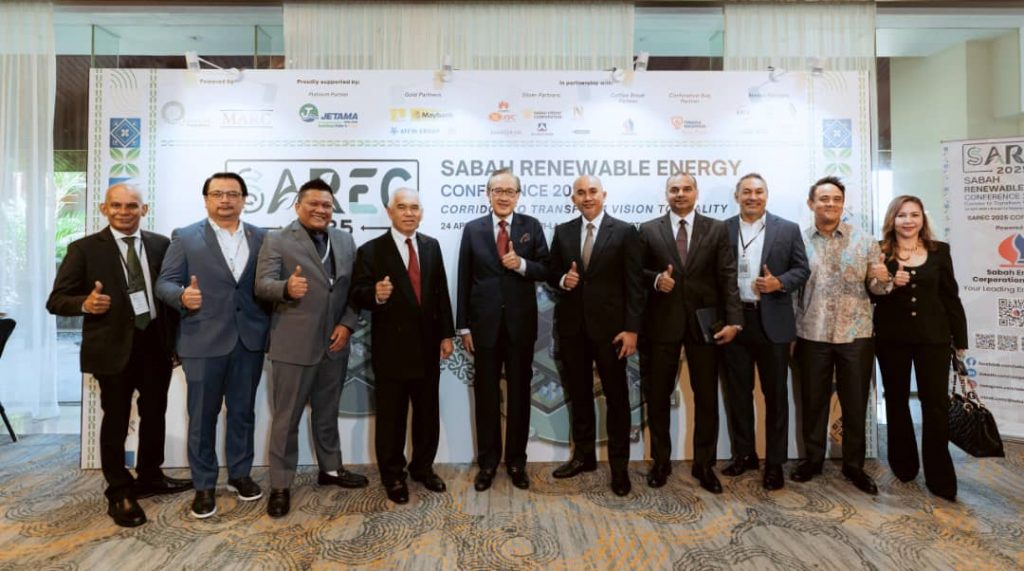 From left: Rajan Paramesran, Chief Executive Officer of MARC Ratings Berhad; Datuk Adzmir Abd Rahman, Chief Executive Officer of Sabah Energy Corporation Sdn Bhd; Datuk Ahmad Naim bin Uddang, Chief Executive Officer of Jetama Sdn Bhd; Yang Berhormat Datuk Dr Yusof Yacob, Chairman of Qhazanah Sabah Berhad; Yang Berhormat Datuk Seri Panglima Masidi Manjun, Minister of Finance Sabah; Datuk Ahmad Rizal Dahli, Group Chief Executive Officer of Qhazanah Sabah Berhad; Arshad Mohamed Ismail, Group Chief Executive Officer of Malaysian Rating Corporation Berhad; Badrul Hisham Zawawi, Chief Commercial Officer of Malaysian Rating Corporation Berhad; Ahmad Faizal Bin Ahmad Zazli, Managing Director, CC – Federal & State, GB – Client Coverage, Maybank; and Amylyn Blantocas Tiamson, Regional Director – Community Distribution, Maybank — at the launch of the Sabah Renewable Energy Conference 2025 yesterday.
From left: Rajan Paramesran, Chief Executive Officer of MARC Ratings Berhad; Datuk Adzmir Abd Rahman, Chief Executive Officer of Sabah Energy Corporation Sdn Bhd; Datuk Ahmad Naim bin Uddang, Chief Executive Officer of Jetama Sdn Bhd; Yang Berhormat Datuk Dr Yusof Yacob, Chairman of Qhazanah Sabah Berhad; Yang Berhormat Datuk Seri Panglima Masidi Manjun, Minister of Finance Sabah; Datuk Ahmad Rizal Dahli, Group Chief Executive Officer of Qhazanah Sabah Berhad; Arshad Mohamed Ismail, Group Chief Executive Officer of Malaysian Rating Corporation Berhad; Badrul Hisham Zawawi, Chief Commercial Officer of Malaysian Rating Corporation Berhad; Ahmad Faizal Bin Ahmad Zazli, Managing Director, CC – Federal & State, GB – Client Coverage, Maybank; and Amylyn Blantocas Tiamson, Regional Director – Community Distribution, Maybank — at the launch of the Sabah Renewable Energy Conference 2025 yesterday.
Malaysian Rating Corporation Berhad (MARC), in collaboration with Qhazanah Sabah Berhad (QSB), a wholly-owned investment arm of the Sabah State Government, hosted the Sabah Renewable Energy Conference 2025: Corridor to Transform Vision to Reality (SAREC 2025) yesterday on April 24, 2025. The event was held at Shangri-La Tanjung Aru, Kota Kinabalu, Sabah, and was officiated by Yang Amat Berhormat Datuk Seri Panglima Haji Hajiji Haji Noor, the Chief Minister of Sabah, represented by Yang Berhormat Datuk Seri Panglima Masidi Manjun, Minister of Finance Sabah.
SAREC 2025 aimed to complement the Sabah State Government’s efforts to increase the adoption of Renewable Energy in Sabah. The conference saw the participation of more than 250 attendees from government agencies, financial institutions, renewable energy developers, and utilities, among others.
In his keynote address at the opening ceremony of the conference, Yang Amat Berhormat Datuk Seri Panglima Haji Hajiji Haji Noor said, “Sabah is increasing its efforts to proactively build a renewable energy future, capitalising on its abundant resources to meet the world’s energy needs while ensuring energy security, affordability and sustainability.”
“With the shift of regulatory power guided by the Sabah Energy Roadmap and Master Plan 2040 (SE-RAMP 2040), we hope to mirror the objectives of the National Energy Transition Roadmap (NETR) in creating our own flagship projects to mark our transition into a state with lower greenhouse gas emissions by 2050. Most importantly, what we envision is that these projects will place Sabah as one of the main contributors to the target set out in NETR in terms of increasing the gross domestic product from RM25 billion in 2023 to RM220 billion, and generating 310,000 jobs by 2050,” he added.
“Under the Malaysia Renewable Energy Roadmap, the government has set a target to increase the nation’s renewable energy capacity from 23% in 2020 to 31% by 2025, and 40% by 2035. However, with Malaysia’s current renewable energy share lagging global and regional averages, a concerted and accelerated effort is needed to meet these commitments and solidify the country’s position as a leader in the transition to renewable energy. This underscores the importance of our discussions here at SAREC 2025,” commented MARC’s Group Chief Executive Officer, Arshad Mohamed Ismail.
“The launch of the Sabah Energy Roadmap and Master Plan 2040 marks a bold vision to achieve reliable, accessible, affordable and sustainable energy by 2040. With ambitious targets — 50% renewable installed capacity by 2035, universal rural electrification by 2030, and carbon neutrality by 2050 — achieving these goals demands substantial investment and robust public–private partnerships. In this context, I am proud to share how MARC is uniquely positioned to support Sabah’s sustainable energy goals through our expertise in credit ratings, green financing, and investment facilitation,” remarked Arshad.
Datuk Ahmad Rizal Dahli, Group Chief Executive Officer of Qhazanah Sabah Berhad, stated that SAREC 2025 not only symbolises QSB’s core value of collaborating with others, but also its collective commitment with both public and private stakeholders to facilitate knowledge sharing and discourses in driving the growth of the renewable energy sector in Sabah.
“For us, SAREC 2025 is more than just a company milestone — it is a collective effort by all in delivering the State’s aspiration of providing affordable, greener energy. Green financing, sustainable investment models, and ESG-aligned capital flows are no longer optional — they are fundamental pillars of future growth,” he said.
The conference kicked off with a presentation on the economic and market outlook for 2025 and beyond, followed by a presentation on the current state of Renewable Energy in Sabah. The conference then continued with four panel sessions and a fireside chat, discussing the challenges in the expansion of the renewable energy sector in Sabah, policy, financial as well as investment strategies for growth and returns in Sabah’s renewable energy sector, as well as collaboration and partnership opportunities.







